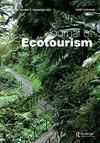Starting anew: ecotourism and resilience principles as a framework for building wildlife destination sustainability in a post-COVID-19 pandemic world
IF 2.4
Q2 HOSPITALITY, LEISURE, SPORT & TOURISM
引用次数: 1
Abstract
The wildlife tourism industry faces increasing threats of climate change and human demand, both of which have been exacerbated by the COVID-19 pandemic. The decrease in human activity resulting from the pandemic has created disruptions for wildlife tourism destinations that are being felt by the local communities, the wildlife, and the surrounding environment. This paper examines the impacts of these disruptions and highlights the opportunity for wildlife destinations to start building back towards the goal of sustainability with increased resilience. The principles of resilience and ecotourism are examined, with the intersecting and applicable fundamentals further explained. A framework for wildlife destination sustainability is then presented alongside a conceptual model for policymakers, tourism operators, and community leaders to consider. This study argues that wildlife tourism destinations should apply and promote sound ecotourism principles to better prepare for and recover from disruptions, promote biodiversity conservation, and support socio-economic stability. © 2023 Informa UK Limited, trading as Taylor & Francis Group.重新开始:在2019冠状病毒病大流行后的世界,将生态旅游和复原力原则作为构建野生动物目的地可持续性的框架
野生动物旅游业面临着日益严重的气候变化和人类需求威胁,而COVID-19大流行又加剧了这两方面的威胁。大流行导致的人类活动减少对野生动物旅游目的地造成了破坏,当地社区、野生动物和周围环境都感受到了这种破坏。本文研究了这些破坏的影响,并强调了野生动物目的地开始重建可持续发展目标的机会,并增加了恢复力。研究了恢复力和生态旅游的原则,并进一步解释了交叉和适用的基本原理。然后提出了野生动物目的地可持续发展的框架,以及供政策制定者、旅游经营者和社区领导人考虑的概念模型。本研究认为,野生动物旅游地应应用和推广良好的生态旅游原则,以更好地准备和恢复破坏,促进生物多样性保护,并支持社会经济稳定。©2023 Informa UK Limited以Taylor & Francis Group的名义进行交易。
本文章由计算机程序翻译,如有差异,请以英文原文为准。
求助全文
约1分钟内获得全文
求助全文
来源期刊

Journal of Ecotourism
Social Sciences-Geography, Planning and Development
CiteScore
6.40
自引率
12.50%
发文量
32
期刊介绍:
The Journal of Ecotourism seeks to advance the field by examining the social, economic, and ecological aspects of ecotourism at a number of scales, and including regions from around the world. Journal of Ecotourism welcomes conceptual, theoretical, and empirical research, particularly where it contributes to the dissemination of new ideas and models of ecotourism planning, development, management, and good practice. While the focus of the journal rests on a type of tourism based principally on natural history - along with other associated features of the man-land nexus - it will consider papers which investigate ecotourism as part of a broader nature based tourism, as well as those works which compare or contrast ecotourism/ists with other forms of tourism/ists.
 求助内容:
求助内容: 应助结果提醒方式:
应助结果提醒方式:


